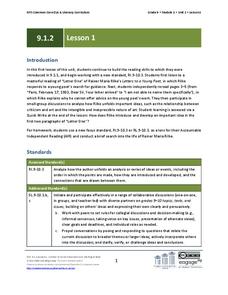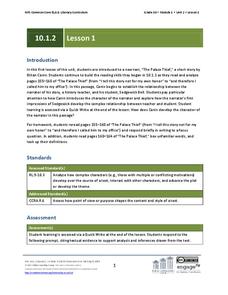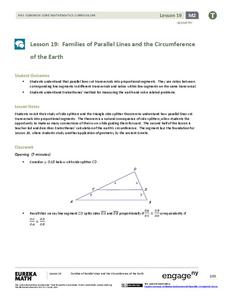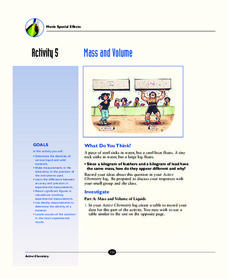EngageNY
Summarizing Bivariate Categorical Data with Relative Frequencies
It is hard to determine whether there is a relationship with the categorical data, because the numbers are so different. Working with a familiar two-way table on super powers, the class determines relative frequencies for each cell and...
Maryland Department of Education
The Concept of Identity Lesson 4: The Psychological Approach
Readers apply Sigmund Freud's theories of the unconscious mind and the psychological approach to literary criticism to analyze and evaluate the relationship between two characters in A Separate Peace.
EngageNY
Grade 10 ELA Module 1: Unit 3, Lesson 1
The Joy Luck Club by Amy Tan is an illustrative source of rich prose, deep character development, and strong literary themes. Use two of the book's key chapters, which focus on Waverly's relationship with chess and with her mother, to...
EngageNY
Grade 10 ELA Module 1: Unit 3, Lesson 5
Even the most rigid expectations come from a place of deeply held values. In a key chapter of Amy Tan's The Joy Luck Club, explore the ways that Jing-Mei's mother's parental expectations affect her relationship with Jing-Mei. Tenth...
EngageNY
Grade 10 ELA Module 1: Unit 3, Lesson 3
Few studies have captured the complex relationships between mothers and daughters, such as Amy Tan's The Joy Luck Club. Tenth graders read "Rules of the Game," which describes Waverly's youth in chess tournaments, and compare how she...
EngageNY
Grade 10 ELA Module 1: Unit 3, Lesson 4
Vivid quotes and strong sensory language compose Amy Tan's The Joy Luck Club, bringing the women to life as they navigate through issues surrounding identity and maternal relationships. Examine Waverly's relationship with her mother...
EngageNY
Grade 10 ELA Module 1: Unit 3, Lesson 7
Track character development with an excerpt from Amy Tan's The Joy Luck Club. As tenth graders examine the relationship between Jing-Mei and her mother, they compare both characters' expectations of each other in the chapter "Two Kinds."
EngageNY
Grade 10 ELA Module 1: Unit 3, Lesson 12
Relationships between characters generate energy that propels the plot and connects events with a central idea. Track character development and meaningful relationships with a literary analysis lesson focused on H.G. Bissinger's Friday...
EngageNY
Grade 9 ELA Module 1, Unit 2, Lesson 6
Guided by the provided questions, readers of David Mitchell's "Hangman" examine the author's figurative language to develop the constant struggle in Jason and Hangman's relationship.
EngageNY
Grade 9 ELA Module 1, Unit 2, Lesson 1
Where does a writer find inspiration? "Go into yourself," says Rainer Maria Rilke in "Letter One" from Letters to a Young Poet. Readers of Rilke's letter to Franz Xaver Kappus examine the words and figurative language Rilke uses to...
EngageNY
Grade 10 ELA Module 1: Unit 2, Lesson 2
Class members continue their reading of Ethan Canin's "The Palace Thief," focusing on how the relationship between the narrator and Sedgewick changes after the narrator meets Sedgewick's father.
EngageNY
Grade 10 ELA Module 1: Unit 2, Lesson 1
The complex relationship between a teacher and his student takes center stage in an instructional activity that asks readers to pay close attention to how author Ethan Canin introduces his characters and how he develops the character of...
EngageNY
Grade 9 ELA Module 1: Unit 3, Lesson 7
How does Shakespeare use dialogue to develop the idea that the star-crossed lovers are more concerned with their relationship as individuals than they are with their roles as children of warring families? That is the question facing...
EngageNY
Families of Parallel Lines and the Circumference of the Earth
How do you fit a tape measure around the Earth? No need if you know a little geometry! Pupils begin by extending their understanding of the Side Splitter Theorem to a transversal cut by parallel lines. Once they identify the proportional...
EngageNY
How Far Away Is the Moon?
Does the space shuttle have an odometer? Maybe, but all that is needed to determine the distance to the moon is a little geometry! The lesson asks scholars to sketch the relationship of the Earth and moon using shadows of an eclipse....
EngageNY
Special Relationships Within Right Triangles—Dividing into Two Similar Sub-Triangles
Why are right triangles so special? Pupils begin their study of right triangles by examining similar right triangles. Verifying through proofs, scholars recognize the three similar right triangles formed by drawing the altitude. Once...
Read Works
Plymouth Colony
Read about the tumultuous beginning to the United States with an informational text passage about Colonial America. As young researchers peruse an article about the arrival of the Mayflower, the settlers' relationship to the neighboring...
Barton Math Class
Parallel and Perpendicular Lines Worksheet
With the focus being on parallel, perpendicular, or neither type, practice with three different types of problem solving. Learners start with a simple skill of determining the relationship between slopes and then work towards creating...
Illustrative Mathematics
Trigonometric Ratios and the Pythagorean Theorem
Take an alternative route with trigonometry and let learners connect a tweaked version of the pythagorean theorem to the original in terms of triangle sides. The assignment leads participants towards deriving the Pythagorean identity...
School Improvement in Maryland
Analysis of Marbury v. Madison
Should the United States Supreme Court have the power of judicial review? Instructors guide class members through a review of Marbury v. Madison and assist class members in writing a brief of the case. As independent practice,...
It's About Time
Mass and Volume
Don't be so dense that light bends around you; study the relationship between mass and volume instead. Young chemists measure the density of a variety of liquids and solids. A reading passage and analysis questions introduce pupils to...
Anglophone School District
Fluids: Force in Fluids
Discuss Archimedes' Principle and fluid forces with your young scientists as they describe the relationship between mass, volume, and density during a series of engaging activities. They use the Participle Theory of Matter to explore the...
National Association for the Education of Young Children
Ten Tips for Involving Families through Internet-Based Communication
Communication is key for a successful parent-teacher relationship, but communication can be difficult when there are thirty-plus families involved. Make your life easier with online communication and an article that details 10 tips to...
Bowels Physics
Work, Energy, and Power
Work, energy, and their relationship to power: what is the common thread? Explore this with your class as they learn the concepts of work and energy, both kinetic and potential, before completing multiple practice problems to demonstrate...
Other popular searches
- Healthy Relationships
- Relationships
- Interpersonal Relationships
- Linear Relationships
- Exponential Relationship
- Quadratic Relationships
- Ecological Relationships
- Family Relationships
- Symbiotic Relationships
- Inverse Relationship
- Angle Relationships
- Letter Sound Relationship

























